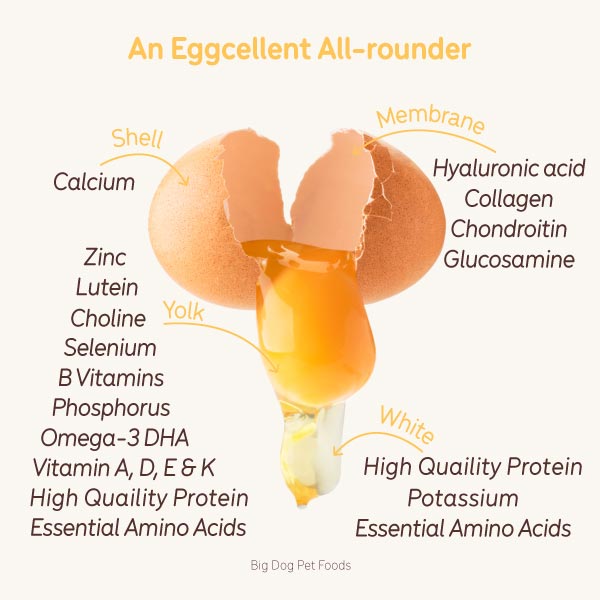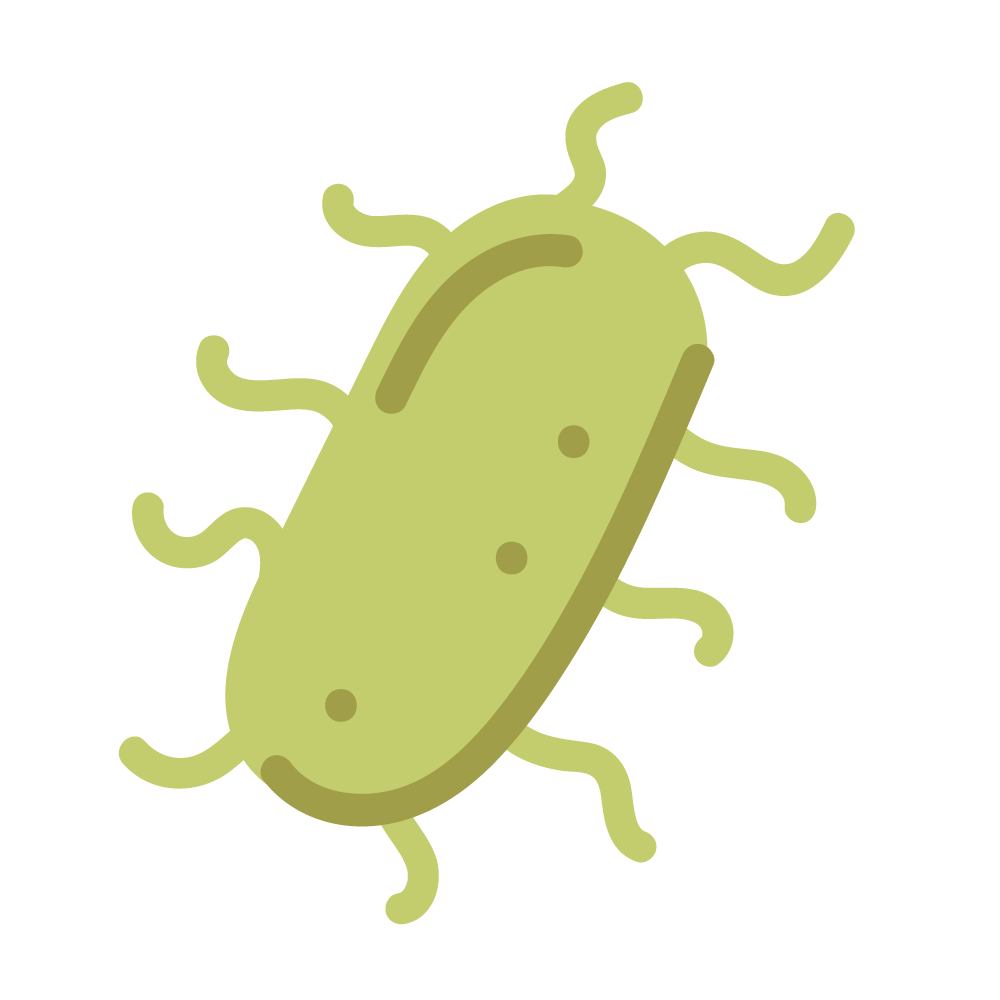Can you feed raw eggs to dogs and cats

A common question for pet parents when researching fresh feeding for their pet is ‘can I feed raw eggs to my pet?’. A good approach is to look at our pets’ wild ancestors who would scavenge and hunt for eggs from bird nests and consumed them raw, including the shell, so it makes sense that our pets would do the same. Many pet owners worry that raw eggs present threats to their pet’s health and wellbeing, such as salmonella poisoning and biotin deficiency, however, this isn’t exactly the case, and the benefits of eggs far outweigh the potential risks.
Benefits of raw eggs for pets

Eggs have some amazing health benefits and are one of the most nutritious foods we can give our pets.
Protein
Eggs are one of the most complete sources available of amino acids, the building blocks of protein. Protein plays a role in various biological functions such as:
- Antibody production — Protein binds to viruses and bacteria
- Enzyme production — Enzymes carry out various chemical reactions depending on the body's needs
- Structural support — Proteins provide form and structure to cells
- Transport — Cells use protein to transport other elements throughout the body
Vitamins And Minerals
- Calcium - bone and cartilage development and repair
- Choline - supports brain and neurological function, a healthy heart and can also boost metabolism
- Fatty acids – supports healthy brain functions, skin and coat health, joints, and immune system support
- Iron - blood production and energy
- Phosphorus – strengthens and supports bones and teeth, DNA, RNA, membrane structure and energy production
- Selenium - behaves as an antioxidant in the body
- Vitamin A – healthy eyesight, bone growth, and immune system support
- Vitamin B2 – helps to convert food into fuel
- Vitamin B9 – formation of red blood cells, protein metabolism
- Vitamin B12 – supports nerve functions
- Vitamin D – boosts immunity, calcium and phosphorus regulation, healthy teeth, supports bones and muscles
- Vitamin E – supports healthy immunity and is also a powerful antioxidant
- Vitamin K - proper clotting of blood, and bone metabolism
- Zinc – supports healthy immunity, growth and development including pregnancy
These vitamins and minerals in appropriate amounts are essential to maintain the health and wellbeing in our pets.
What Are the Risks to Our Pets?

Salmonella and Raw Eggs
Many pet owners worry that feeding raw eggs brings the risk of salmonella poisoning, however, nature always intended our pets to eat raw, hence their bodies are biologically adept to process a raw food diet, along with the naturally occurring bacteria. The highly acidic pH of their stomach and accompanying short digestive tract assists passing of pathogens, without any health concerns.
We recommend feeding your pets high-quality eggs that are stored at cool temperatures to keep bacteria at a manageable level.

Biotin Deficiency with Raw Eggs
There's concern that feeding dogs eggs may be dangerous because it contains avidin, which is a biotin-binding protein. Biotin (vitamin B7) is involved in a wide range of metabolic processes related to the utilisation of fats, carbohydrates, and amino acids in the body and can help maintain energy levels and nervous system function. Biotin deficiency appears as dry and flaky skin, brittle hair, and hair loss.
Biotin deficiency isn’t an issue when the eggs and yolk are consumed together. Make sure that when feeding eggs, you also feed them the yolk to prevent your dog from becoming deficient in biotin.

Can My Pet Eat the Eggshell?
Eggshells are a great source of calcium, which helps your pet grow strong bones and teeth. The membrane lining in the eggshell is rich in collagen, chondroitin, hyaluronic acid, and glucosamine which are excellent for joint health.
The best way to feed eggshell is to feed the whole egg, however if you wanted to add only the eggshell as a calcium boost, dry the eggshells, then grind them into a powder to sprinkle on top of their meal.

Egg Allergies
Some dogs can have an allergic reaction or sensitivity to eggs; however, it is very uncommon and is rarely related to chicken allergies and intolerances. It is important to acknowledge that one of the biggest culprits in food-based allergens for pets isn’t the whole food itself, it’s the processed version of it. Highly processed foods can change how a protein, or allergen, is presented to the body.
Veterinarian Duncan Houston advises “I wouldn’t avoid eggs unless you’ve had a specialist veterinary dermatologist diagnose an allergic response or you have completed a strict elimination dietary trial that has been confirmed with rechallenging and provocation to a single or several specific chicken muscle tissue, egg yolk or egg white proteins – eggs are simply too beneficial to rule out on a hunch without evidence to substantiate a true allergy.” Read more.
Tips for feeding Raw Eggs
- Both cooked eggs and raw eggs offer essential vitamins and nutrition, but raw eggs for dogs are superior as cooking eggs reduces some of the vitamins and minerals.
- There are many variables to consider when adding eggs to your pet’s diet, including their age, activity level and weight. According to the USDA, an egg contains 70 calories and 6 grams of protein — remember to take this into consideration. If you have a small pet, you may want to feed the egg over a few meals while larger pets can typically eat the full egg.
- Not all eggs are equal when it comes to quality and nutrition. It is recommended to source eggs from free-range farms locally, if possible, as healthier birds lay more nutritious eggs.
- Store eggs at cool temperatures to keep bacteria at a manageable level – never feed expired or rotten eggs.
- If you feed kibble, adding an egg on top of your pet’s meal can boost the overall nutrients tremendously.
Eggs are quite literally a “whole” in one, when it comes to our pets and dismissing any part means the entire benefits of this superfood may also be missed. If raw eggs do not work for your pet, cooked eggs still offer plenty of nutrients to help boost your pet’s diet.
